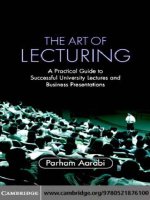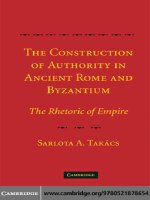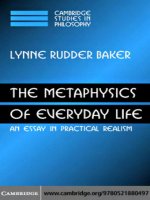0521826616 cambridge university press the difficulty of tolerance essays in political philosophy aug 2003
Bạn đang xem bản rút gọn của tài liệu. Xem và tải ngay bản đầy đủ của tài liệu tại đây (2.41 MB, 284 trang )
T H E D I F F I C U LT Y O F TO L E R A N C E
These essays in political philosophy by T. M. Scanlon, written between 1969 and 1999, examine the standards by which social and
political institutions should be justified and appraised. Scanlon explains how the powers of just institutions are limited by rights such
as freedom of expression, and considers why these limits should be
respected even when it seems that better results could be achieved by
violating them. Other topics which are explored include voluntariness and consent, freedom of expression, tolerance, punishment, and
human rights. The collection includes the classic essays “Preference
and Urgency,” “A Theory of Freedom of Expression,” and “Contractualism and Utilitarianism,” as well as a number of other essays that
have hitherto not been easily accessible. It will be essential reading
for all those studying these topics from the perspective of political
philosophy, politics, and law.
t. m . s c a n lo n is Alford Professor of Natural Religion, Moral
Philosophy, and Civil Polity at Harvard University. He is the author
of What We Owe to Each Other (Harvard University Press, 1998) and
numerous articles on moral and political philosophy.
THE DIFFICULTY OF
TOLERANCE
Essays in Political Philosophy
T. M. SCANLON
Harvard University
Cambridge, New York, Melbourne, Madrid, Cape Town, Singapore, São Paulo
Cambridge University Press
The Edinburgh Building, Cambridge , United Kingdom
Published in the United States of America by Cambridge University Press, New York
www.cambridge.org
Information on this title: www.cambridge.org/9780521826617
© T. M. Scanlon 2003
This book is in copyright. Subject to statutory exception and to the provision of
relevant collective licensing agreements, no reproduction of any part may take place
without the written permission of Cambridge University Press.
First published in print format 2003
-
isbn-13 978-0-511-06260-5 eBook (NetLibrary)
-
isbn-10 0-511-06260-5 eBook (NetLibrary)
-
isbn-13 978-0-521-82661-7 hardback
-
isbn-10 0-521-82661-6 hardback
-
isbn-13 978-0-521-53398-0 paperback
-
isbn-10 0-521-53398-8 paperback
Cambridge University Press has no responsibility for the persistence or accuracy of
s for external or third-party internet websites referred to in this book, and does not
guarantee that any content on such websites is, or will remain, accurate or appropriate.
For Lucy
Contents
Acknowledgments
page viii
Introduction
1
1 A theory of freedom of expression
6
2 Rights, goals, and fairness
26
3 Due process
42
4 Preference and urgency
70
5 Freedom of expression and categories of expression
84
6 Human rights as a neutral concern
113
7 Contractualism and utilitarianism
124
8 Content regulation reconsidered
151
9 Value, desire, and quality of life
169
10 The difficulty of tolerance
187
11 The diversity of objections to inequality
202
12 Punishment and the rule of law
219
13 Promises and contracts
234
Index
270
vii
Acknowledgments
The essays in this volume appeared in the following publications:
“A Theory of Freedom of Expression,” Philosophy and Public Affairs 1, no. 2
(1972), 204–26.
“Rights, Goals, and Fairness,” in Stuart Hampshire, ed., Public and Private Morality (Cambridge: Cambridge University Press, 1978), pp. 93–
125.
“Due Process,” in J. R. Pennock and J. W. Chapman, eds., Nomos XVIII:
Due Process (New York: New York University Press, 1977), pp. 93–
125.
“Preference and Urgency,” Journal of Philosophy 72 (1975), 655–69.
“Freedom of Expression and Categories of Expression,” University of
Pittsburgh Law Review 40, no. 4 (1979), 519–50.
“Human Rights as a Neutral Concern,” in Peter Brown and Douglas
Maclean, eds., Human Rights and U.S. Foreign Policy (Lexington:
Lexington Books, 1979), pp. 83–92.
“Contractualism and Utilitarianism,” in Amartya Sen and Bernard
Williams, eds., Utilitarianism and Beyond (Cambridge: Cambridge
University Press, 1982), pp. 103–28.
“Content Regulation Reconsidered,” in Judith Lichtenberg, ed., Democracy
and the Mass Media (Cambridge: Cambridge University Press, 1990),
pp. 331–54.
“Value, Desire, and Quality of Life,” in Martha Nussbaum and Amartya
Sen, eds., The Quality of Life (Oxford: Clarendon Press, 1993),
pp. 185–207.
“The Difficulty of Tolerance,” in David Heyd, ed., Toleration: An Elusive
Virtue (Princeton: Princeton University Press, 1996), pp. 226–39.
“The Diversity of Objections to Inequality,” The Lindley Lecture, University of Kansas, 1996.
viii
Acknowledgments
ix
“Punishment and the Rule of Law,” in Harold Hongju Koh and Ronald
Slye, eds., Deliberative Democracy and Human Rights (New Haven: Yale
University Press, 1999), pp. 257–71.
“Promises and Contracts,” in Peter Benson, ed., The Theory of Contract
Law (Cambridge: Cambridge University Press, 2001), pp. 86–117.
Introduction
The essays collected here are concerned with the standards by which political, legal, and economic institutions should be assessed. One obvious standard is the degree to which these institutions promote human well-being.
But it is also relevant to ask whether institutions are just and whether they
respect the rights of individuals. The tension between these two forms of
assessment is a central theme in these essays. In order to understand this
tension, and decide how to respond to it, several things are required. The
first is a better understanding of the idea of well-being and of the ways in
which it comes to have moral significance. The second is a deeper understanding of notions such as rights, justice, liberty, and equality, which seem
to be, at least potentially, in conflict with the goal of well-being. To what
degree are these notions themselves best understood and justified in terms
of well-being? Insofar as they are not to be understood in this way, how is
their moral force to be explained? The following essays are devoted to these
tasks. My aim is not to eliminate this tension – that would be impossible –
but to make it less puzzling by placing the notions it involves within a
common moral framework. In the case of rights, I believe that the tension
is best understood not as arising between rights and well-being, seen as
entirely independent and potentially conflicting moral ideas, but rather as
a tension that arises within our understanding of rights themselves.
Freedom of expression provides a good example of this tension. The
right of free expression would be easy to defend, but pointless, if it applied
only to expression that has no serious consequences. It does its work, and
our commitment to it is put to the test, by expression that threatens to
cause serious harm by, for example, fomenting political unrest or by revealing information that is deemed crucial to national security. So some
explanation needs to be given of how it can be wrong for governments to
prevent these harms by barring the expression that will lead to them. In
“A Theory of Freedom of Expression” (essay 1), I attempted to respond to
this challenge. The central component of that article is what I called the
1
2
The Difficulty of Tolerance
Millian Principle, which limits the consequences that can be appealed to in
justifying governmental restrictions on expression. According to that principle, justifications for restricting a form of expression cannot not be based
on the fact that, if unrestricted, it would lead people to form false beliefs,
or on the harmful consequences of the actions that it would lead people
to see as worth performing. I argued that citizens who view themselves as
autonomous cannot not accept justifications that violate this principle.
After completing that article I intended to write a book on freedom
of expression, and in 1975 I set to work on this project. My plan was to
develop more fully the theory outlined in the article and then to discuss
its implications for traditional issues of freedom of expression, such as
the permissibility of laws against incitement, libel, and expression that
threatens national security. I thought that this would not be difficult, but
things did not work out as I had expected. The theory I had developed
failed to give plausible answers in several of the cases I wanted to discuss.
So, following the method of reflective equilibrium, I set out to revise the
theory. But the changes required were fundamental. The problem was that
the Millian Principle, the centerpiece of the theory, placed too tight a
constraint on possible justifications for restricting expression.1 Looking for
a new foundation for my account, I began thinking about what it meant to
say that freedom of expression was a right. This led me in turn to the more
wide-ranging questions of how rights in general should be understood and
how rights limit what can be done in the service of desirable goals.
Questions about rights were also on my mind for other reasons. Robert
Nozick’s Anarchy, State, and Utopia had just appeared and was the subject
of much discussion, as was the work of Judith Thomson, in which rights
also played a central role. I was attracted by the idea of rights as constraints
on the pursuit of good consequences, although I disagreed somewhat with
Thomson, and more strongly with Nozick, about what rights people have.
I was also concerned with more general questions about rights, such as how
we determine what rights people have and how claims about rights are to be
justified. It seemed to me that rights must be justified by the interests they
serve, but I was not sure in what way this is so. I was also being pressed in
my seminars by Peter Railton and Samuel Scheffler, then graduate students
at Princeton, who maintained that consequentialism provided the best
account of the problems I was concerned with.
The result of this process of thought was “Rights, Goals, and Fairness”
(essay 2), the central thesis of which is what I thought of at the time as an
1
For a fuller discussion of the problem, see essay 5, section iii.
Introduction
3
“instrumental” account of rights. On this account, rights are constraints on
the discretion of individuals or institutions to act, which are justified on the
grounds that they are necessary and feasible means to prevent unacceptable
results that would flow from unlimited discretion. With this view of rights
in hand, I returned to the topic of freedom of expression in “Freedom of
Expression and Categories of Expression” (essay 5) and, later, in “Content
Regulation Reconsidered” (essay 8).
“The Difficulty of Tolerance” (essay 10) deals not only with expression,
but also with other forms of activity that affect the nature of a society
by influencing what others believe and how they act. This essay develops
the idea of “informal politics” that is introduced in the latter parts of
essay 5. More than most of the other essays on rights in this collection,
“The Difficulty of Tolerance” is concerned with the costs of having certain
rights generally recognized, and with the problems posed by their openended character. Its particular concern is with the risks involved in having
one’s society be always open to being altered by the activities of individuals
and groups whose values one does not share. I argue that one must bear
this risk as the price of recognizing one’s fellow citizens as equal members
of society – and thus equally entitled to play a role in determining how that
society evolves.
The account of rights set forth in “Rights, Goals, and Fairness” also
provides the framework for “Human Rights as a Neutral Concern” (essay 6).
This account of rights still seems to me broadly correct, but I do not
believe that it is as close to consequentialism as I suggested in “Rights,
Goals, and Fairness.” The fact that this account appeals to the protection
of individual interests as a source of justification does not suffice to make it
a consequentialist view, and I do not believe that the other values appealed
to in that article, such as equality, are best understood as properties of states
of affairs that are to be promoted.2
It now seems to me that the view of rights set forth in “Rights, Goals,
and Fairness,” rather than being consequentialist, in fact fits best within
the contractualist moral theory I outlined later in “Contractualism and
Utilitarianism” (essay 7), according to which the rightness of actions and
policies depends on their justifiability to individuals rather than on the value
of their consequences. On this view, defensible institutions must promote
the well-being of their citizens in certain ways because this is something
citizens can reasonably demand, not because doing so will yield a more
valuable state of affairs. But direct promotion of their well-being is not the
2
My views on equality are set out more fully in “The Diversity of Objections to Inequality” (essay 11).
4
The Difficulty of Tolerance
only thing that individuals can reasonably demand from their institutions.
They also have reason to insist on being treated fairly, and on basic rights,
which give them important forms of protection and control over their own
lives. Contractualism thus provides a common framework within which
these diverse moral claims can be understood.
I am thus no longer inclined, as I once was, to describe my view of
rights as an “instrumental” account. This label suggests that the benefits
that are promoted by rights are morally fundamental, while the rights, the
observance of which promotes these results, are of only derivative significance. It also may suggest that rights differ from duties and other moral
requirements in having this derivative status. Both of these suggestions
seem to me misleading. Claims about rights, like other claims about what
we owe to each other, are claims about the constraints on individual action,
and on social institutions, that people can reasonably insist on. In order
to decide what rights people have, we need to consider both the costs of
being constrained in certain ways and what things would be like in the
absence of such constraints, and we need to ask what objections people
could reasonably raise on either of these grounds. But the fact that claims
about rights, like other moral claims, need to be justified in this way, does
not make rights morally derivative, or mere instruments for the production
of morally valuable states of affairs.
If claims about what individuals have reason to want are to play an
important role in the justification of rights and of institutions, this raises the
question of how such claims are themselves to be understood and defended.
This question has seemed closely related to the problem of giving an account
of well-being, since it is natural to suppose that what a person has a morally
significant interest in are just those things that contribute importantly to
his or her well-being. When I first began working in this area, preferences
were widely thought to provide the answers to both of these questions. The
most widely held views of individual well-being identified a person’s level
of well-being with the degree to which his or her preferences (or perhaps
“informed” preferences) were fulfilled. Similarly, individual preferences (or
perhaps informed preferences) were widely held to be the primary starting
points for the justification of institutions and moral principles.
Both of these views seemed to me mistaken. I set out in “Preference and
Urgency” (essay 4) to explain why, and to call attention to the problem of
explaining the basis of morally significant claims about individual interests
and well-being. I pursued these questions in a series of further articles,
including “Value, Desire, and Quality of Life” (essay 9). As I indicate in
that essay, it now seems to me that the task of giving an overall account of
Introduction
5
well-being and that of explaining the basis of morally significant interests
are less closely related than I at first supposed.3
Consent is another idea that is often held to play a central role in the justification of institutions. Fundamental economic and political institutions
cannot be justified simply on the ground that those to whom they apply
have consented to their authority. Nonetheless, in order to be justifiable, institutions must give individuals the power to shape many of their particular
obligations through the choices they make. The fact that an individual has
chosen a certain outcome, or could have avoided it by choosing differently,
is often an important reason why that outcome is legitimate. Essays 12 and
13 deal with different ways in which this is the case. In “Punishment and
the Rule of Law” (essay 12) I take issue with an account according to which
the legitimacy of punishment derives from the fact that the criminal, in
breaking the law, has consented to the legal consequences of his doing so.
I offer an alternative explanation of the way in which the justification of
punishment depends on the fact that individuals can avoid punishment
by choosing appropriately. In “Promises and Contracts” (essay 13) I offer a
similar explanation of the role that the value of choice plays in the justification of the enforcement of legal contracts, and I raise some questions
about appeals to the notion of voluntariness in this justification.
These essays were written over a thirty-year period, from the late 1960s
to the late 1990s. They are printed here in the order in which they were
written, and with only minor editorial changes. Rereading them, I find
many points where much more needs to be said, and many where I would
say something different if I were writing today. I expect that other readers
will have similar reactions, and I hope this will inspire or provoke them to
carry these inquiries further.
3
My current view of these matters is set out in chapter 3 of What We Owe to Each Other (Cambridge,
MA: Harvard University Press, 1998).
1
A theory of freedom of expression
Persecution for the expression of opinions seems to me perfectly logical. If you have no doubt of your premises or your power and want
a certain result with all your heart you naturally express your wishes
in law and sweep away all opposition. To allow opposition by speech
seems to indicate that you think the speech impotent, as when a man
says that he has squared the circle, or that you do not care wholeheartedly for the result, or that you doubt either your power or your
premises. But . . .
Oliver Wendell Holmes1
i
The doctrine of freedom of expression is generally thought to single out
a class of “protected acts” which it holds to be immune from restrictions
to which other acts are subject. In particular, on any very strong version
of the doctrine there will be cases where protected acts are held to be
immune from restriction despite the fact that they have as consequences
harms which would normally be sufficient to justify the imposition of legal
sanctions. It is the existence of such cases which makes freedom of expression
a significant doctrine and which makes it appear, from a certain point of
view, an irrational one. This feeling of irrationality is vividly portrayed by
Justice Holmes in the passage quoted.
To answer this charge of irrationality is the main task of a philosophical
defense of freedom of expression. Such an answer requires, first, a clear
account of what the class of protected acts is, and then an explanation
of the nature and grounds of its privilege. The most common defense
of the doctrine of freedom of expression is a consequentialist one. This
1
This paper is derived from one presented to the Society for Ethical and Legal Philosophy, and I
am grateful to the members of that group, as well as to a number of other audiences willing and
unwilling, for many helpful comments and criticisms.
Dissenting in Abrams v. United States, 250 U.S. 616 (1919).
6
A theory of freedom of expression
7
may take the form of arguing with respect to a certain class of acts, e.g.
acts of speech, that the good consequences of allowing such acts to go
unrestricted outweigh the bad. Alternatively, the boundaries of the class of
protected acts may themselves be defined by balancing good consequences
against bad, the question of whether a certain species of acts belongs to
the privileged genus being decided in many if not all cases just by asking
whether its inclusion would, on the whole, lead to more good consequences
than bad. This seems to be the form of argument in a number of notable
court cases, and at least some element of balancing seems to be involved in
almost every landmark First Amendment decision.2 Thus one thing which
an adequate philosophical account of freedom of expression should do is
to make clear in what way the definition of the class of protected acts and
the justification for their privilege depend upon a balancing of competing
goals or interests and to what extent they rest instead on rights or other
absolute, i.e. nonconsequentialist, principles. In particular, one would like
to know to what extent a defender of freedom of expression must rest his
case on the claim that the long-term benefits of free discussion will outweigh
certain obvious and possibly severe short-run costs, and to what extent this
calculation of long-term advantage depends upon placing a high value on
knowledge and intellectual pursuits as opposed to other values.
A further question that an adequate account of freedom of expression
should answer is this: to what extent does the doctrine rest on natural moral
principles and to what extent is it an artificial creation of particular political
institutions? An account of freedom of expression might show the doctrine
to be artificial in the sense I have in mind if, for example, it identified the
class of protected acts simply as those acts recognized as legitimate forms
of political activity under a certain constitution and gave as the defense of
their privilege merely a defense of that constitution as reasonable, just, and
binding on those to whom it applied. A slightly different “artificial” account
of freedom of expression is given by Meiklejohn,3 who finds the basis for the
privileged status of acts of expression in the fact that the right to perform
such acts is necessary if the citizens of a democratic state are to perform
their duties as self-governing citizens. On his view it appears that citizens
not expected to “govern themselves” would lack (at least one kind of ) right
to freedom of expression. In contrast to either of these views, Mill’s famous
2
3
The balancing involved in such decisions is not always strictly a matter of maximizing good consequences, since what is “balanced” often includes personal rights as well as individual and social
goods. The problems involved in “balancing” rights in this way are forcefully presented by Ronald
Dworkin in “Taking Rights Seriously,” New York Review of Books, December 17, 1970, pp. 23–31.
Alexander Meiklejohn, Political Freedom, 2nd edn. (New York: Harper & Row, 1965). See esp. p. 79.
8
The Difficulty of Tolerance
argument offers a defense of “the liberty of thought and discussion” which
relies only on general moral grounds and is independent of the features
of any particular laws or institutions. It seems clear to me that our (or at
least my) intuitions about freedom of expression involve both natural and
artificial elements. An adequate account of the subject should make clear
whether these two kinds of intuitions represent rival views of freedom of
expression or whether they are compatible or complementary.
Although I will not consider each of these questions about freedom of
expression in turn, I hope by the end of this discussion to have presented
a theory which gives answers to all of them. I begin with an oblique attack
on the first.
ii
The only class of acts I have mentioned so far is the class “acts of expression,”
which I mean to include any act that is intended by its agent to communicate
to one or more persons some proposition or attitude. This is an extremely
broad class. In addition to many acts of speech and publication it includes
displays of symbols, failures to display them, demonstrations, many musical
performances, and some bombings, assassinations, and self-immolations.
In order for any act to be classified as an act of expression it is sufficient
that it be linked with some proposition or attitude which it is intended to
convey.
Typically, the acts of expression with which a theory of “free speech” is
concerned are addressed to a large (if not the widest possible) audience,
and express propositions or attitudes thought to have a certain generality
of interest. This accounts, I think, for our reluctance to regard as an act of
expression in the relevant sense the communication between the average
bank robber and the teller he confronts. This reluctance is diminished
somewhat if the note the robber hands the teller contains, in addition to
the usual threat, some political justification for his act and an exhortation
to others to follow his example. What this addition does is to broaden the
projected audience and increase the generality of the message’s interest. The
relevance of these features is certainly something which an adequate theory
of freedom of expression should explain, but it will be simpler at present
not to make them part of the definition of the class of acts of expression.
Almost everyone would agree, I think, that the acts which are protected
by a doctrine of freedom of expression will all be acts of expression in
the sense I have defined. However, since acts of expression can be both
violent and arbitrarily destructive, it seems unlikely that anyone would
A theory of freedom of expression
9
maintain that as a class they were immune from legal restrictions. Thus
the class of protected acts must be some proper subset of this class. It is
sometimes held that the relevant subclass consists of those acts of expression
which are instances of “speech” as opposed to “action.” But those who put
forward such a view have generally wanted to include within the class of
protected acts some which are not speech in any normal sense of the word
(for instance, mime and certain forms of printed communication) and to
exclude from it some which clearly are speech in the normal sense (talking
in libraries, falsely shouting “fire” in crowded theaters, etc.). Thus if acts
of speech are the relevant subclass of acts of expression, then “speech” is
here functioning as a term of art which needs to be defined. To construct
a theory following these traditional lines we might proceed to work out
a technical correlate to the distinction between speech and action which
seemed to fit our clearest intuitions about which acts do and which do not
qualify for protection.4
To proceed in this way seems to me, however, to be a serious mistake.
It seems clear that the intuitions we appeal to in deciding whether a given
restriction infringes freedom of expression are not intuitions about which
things are properly called speech as opposed to action, even in some refined
sense of “speech.” The feeling that we must look for a definition of this kind
has its roots, I think, in the view that since any adequate doctrine of freedom
of expression must extend to some acts a privilege not enjoyed by all, such
a doctrine must have its theoretical basis in some difference between the
protected acts and others, i.e. in some definition of the protected class. But
this is clearly wrong. It could be, and I think is, the case that the theoretical
bases of the doctrine of freedom of expression are multiple and diverse, and
while the net effect of these elements taken together is to extend to some acts
a certain privileged status, there is no theoretically interesting (and certainly
no simple and intuitive) definition of the class of acts which enjoys this
privilege. Rather than trying at the outset to carve out the privileged subset
of acts of expression, then, I propose to consider the class as a whole and
to look for ways in which the charge of irrationality brought against the
doctrine of freedom of expression might be answered without reference to
a single class of privileged acts.
As I mentioned at the start, this charge arises from the fact that under
any nontrivial form of the doctrine there will be cases in which acts of
expression are held to be immune from legal restriction despite the fact
4
This task is carried out by Thomas Emerson in Toward a General Theory of the First Amendment
(New York: Random House, 1966). See esp. pp. 60–2.
10
The Difficulty of Tolerance
that they give rise to undoubted harms which would in other cases be
sufficient to justify such restriction. (The “legal restriction” involved here
may take the form either of the imposition of criminal sanctions or of the
general recognition by the courts of the right of persons affected by the
acts to recover through civil suits for damages.) Now it is not in general
sufficient justification for a legal restriction on a certain class of acts to
show that certain harms will be prevented if this restriction is enforced.
It might happen that the costs of enforcing the restriction outweigh the
benefits to be gained, or that the enforcement of the restriction infringes
some right either directly (e.g. a right to the unimpeded performance of
exactly those acts to which the restriction applies) or indirectly (e.g. a
right which under prevailing circumstances can be secured by many only
through acts to which the restriction applies). Alternatively, it may be that
while certain harms could be prevented by placing legal restrictions on a
class of acts, those to whom the restriction would apply are not responsible for those harms and hence cannot be restricted in order to prevent
them.
Most defenses of freedom of expression have rested upon arguments of
the first two of these three forms. In arguments of both these forms factors
which taken in isolation might have been sufficient to justify restrictions
on a given class of acts are held in certain cases to be overridden by other
considerations. As will become clear later, I think that appeals both to
rights and to the balancing of competing goals are essential components
of a complete theory of freedom of expression. But I want to begin by
considering arguments which, like disclaimers of responsibility, have the
effect of showing that what might at first seem to be reasons for restricting
a class of acts cannot be taken as such reasons at all.
My main reason for beginning in this way is this: it is easier to say what
the classic violations of freedom of expression have in common than it
is to define the class of acts which is protected by that doctrine. What
distinguishes these violations from innocent regulation of expression is not
the character of the acts they interfere with but rather what they hope to
achieve – for instance, the halting of the spread of heretical notions. This
suggests that an important component of our intuitions about freedom of
expression has to do not with the illegitimacy of certain restrictions but
with the illegitimacy of certain justifications for restrictions. Very crudely,
the intuition seems to be something like this: those justifications are illegitimate which appeal to the fact that it would be a bad thing if the view
communicated by certain acts of expression were to become generally believed; justifications which are legitimate, though they may sometimes be
A theory of freedom of expression
11
overridden, are those that appeal to features of acts of expression (time,
place, loudness) other than the views they communicate.
As a principle of freedom of expression this is obviously unsatisfactory
as it stands. For one thing, it rests on a rather unclear notion of “the view
communicated” by an act of expression; for another, it seems too restrictive,
since, for example, it appears to rule out any justification for laws against
defamation. In order to improve upon this crude formulation, I want to
consider a number of different ways in which acts of expression can bring
about harms, concentrating on cases where these harms clearly can be
counted as reasons for restricting the acts that give rise to them. I will then
try to formulate the principle in a way which accommodates these cases.
I emphasize at the outset that I am not maintaining in any of these cases
that the harms in question are always sufficient justification for restrictions
on expression, but only that they can always be taken into account.
1. Like other acts, acts of expression can bring about injury or damage
as a direct physical consequence. This is obviously true of the more bizarre
forms of expression mentioned above, but no less true of more pedestrian
forms: the sound of my voice can break glass, wake the sleeping, trigger an
avalanche, or keep you from paying attention to something else you would
rather hear. It seems clear that when harms brought about in this way
are intended by the person performing an act of expression, or when he is
reckless or negligent with respect to their occurrence, then no infringement
of freedom of expression is involved in considering them as possible grounds
for criminal penalty or civil action.
2. It is typical of the harms just considered that their production is in
general quite independent of the view which the given act of expression
is intended to communicate. This is not generally true of a second class
of harms, an example of which is provided by the common law notion
of assault. In at least one of the recognized senses of the term, an assault
(as distinct from a battery) is committed when one person intentionally
places another in apprehension of imminent bodily harm. Since assault in
this sense involves an element of successful communication, instances of
assault may necessarily involve expression. But assaults and related acts can
also be part of larger acts of expression, as for example when a guerrilla
theater production takes the form of a mock bank robbery which starts off
looking like the real thing, or when a bomb scare is used to gain attention
for a political cause. Assault is sometimes treated as inchoate battery, but it
can also be viewed as a separate offense which consists in actually bringing
about a specific kind of harm. Under this analysis, assault is only one of
a large class of possible crimes which consist in the production in others
12
The Difficulty of Tolerance
of harmful or unpleasant states of mind, such as fear, shock, and perhaps
certain kinds of offense. One may have doubts as to whether most of these
harms are serious enough to be recognized by the law or whether standards
of proof could be established for dealing with them in court. In principle,
however, there seems to be no alternative to including them among the
possible justifications for restrictions on expression.
3. Another way in which an act of expression can harm a person is by
causing others to form an adverse opinion of him or by making him an
object of public ridicule. Obvious examples of this are defamation and
interference with the right to a fair trial.
4. As Justice Holmes said, “The most stringent protection of free speech
would not protect a man in falsely shouting fire in a theater and causing a
panic.”5
5. One person may through an act of expression contribute to the production of a harmful act by someone else, and at least in some cases the
harmful consequences of the latter act may justify making the former a
crime as well. This seems to many people to be the case when the act of
expression is the issuance of an order or the making of a threat or when it
is a signal or other communication between confederates.
6. Suppose some misanthropic inventor were to discover a simple
method whereby anyone could make nerve gas in his kitchen out of gasoline, table salt, and urine. It seems just as clear to me that he could be
prohibited by law from passing out his recipe on handbills or broadcasting
it on television as that he could be prohibited from passing out free samples
of his product in aerosol cans or putting it on sale at Abercrombie & Fitch.
In either case his action would bring about a drastic decrease in the general
level of personal safety by radically increasing the capacity of most citizens
to inflict harm on each other. The fact that he does this in one case through
an act of expression and in the other through some other form of action
seems to me not to matter.
It might happen, however, that a comparable decrease in the general
level of personal safety could be just as reliably predicted to result from the
distribution of a particularly effective piece of political propaganda which
would undermine the authority of the government, or from the publication
of a theological tract which would lead to a schism and a bloody civil war. In
these cases the matter seems to me to be entirely different, and the harmful
consequence seems clearly not to be a justification for restricting the acts
of expression.
5
In Schenck v. United States, 249 U.S. 47 (1919).
A theory of freedom of expression
13
What I conclude from this is that the distinction between expression
and other forms of action is less important than the distinction between
expression which moves others to act by pointing out what they take to
be good reasons for action and expression which gives rise to action by
others in other ways, e.g. by providing them with the means to do what
they wanted to do anyway. This conclusion is supported, I think, by our
normal views about legal responsibility.
If I were to say to you, an adult in full possession of your faculties, “What
you ought to do is rob a bank,” and you were subsequently to act on this
advice, I could not be held legally responsible for your act, nor could my act
legitimately be made a separate crime. This remains true if I supplement
my advice with a battery of arguments about why banks should be robbed
or even about why a certain bank in particular should be robbed and why
you in particular are entitled to rob it. It might become false – what I
did might legitimately be made a crime – if certain further conditions
held: for example, if you were a child, or so weak-minded as to be legally
incompetent, and I knew this or ought to have known it; or if you were my
subordinate in some organization and what I said to you was not advice
but an order, backed by the discipline of the group; or if I went on to make
further contributions to your act, such as aiding you in preparations or
providing you with tools or giving you crucial information about the bank.
The explanation for these differences seems to me to be this. A person
who acts on reasons he has acquired from another’s act of expression acts
on what he has come to believe and has judged to be a sufficient basis for
action. The contribution to the genesis of his action made by the act of
expression is, so to speak, superseded by the agent’s own judgment. This
is not true of the contribution made by an accomplice, or by a person
who knowingly provides the agent with tools (the key to the bank) or
with technical information (the combination of the safe) which he uses to
achieve his ends. Nor would it be true of my contribution to your act if,
instead of providing you with reasons for thinking bank robbery a good
thing, I issued orders or commands backed by threats, thus changing your
circumstances so as to make it a (comparatively) good thing for you to do.
It is a difficult matter to say exactly when legal liability arises in these cases,
and I am not here offering any positive thesis about what constitutes being
an accessory, inciting, conspiring, etc. I am interested only in maintaining
the negative thesis that whatever these crimes involve, it has to be something
more than merely the communication of persuasive reasons for action (or
perhaps some special circumstances, such as diminished capacity of the
person persuaded).
14
The Difficulty of Tolerance
I will now state the principle of freedom of expression which was
promised at the beginning of this section. The principle, which seems
to me to be a natural extension of the thesis Mill defends in chapter 2
of On Liberty, and which I will therefore call the Millian Principle, is the
following:
There are certain harms which, although they would not occur but for certain
acts of expression, nonetheless cannot be taken as part of a justification for legal
restrictions on these acts. These harms are: (a) harms to certain individuals which
consist in their coming to have false beliefs as a result of those acts of expression;
(b) harmful consequences of acts performed as a result of those acts of expression,
where the connection between the acts of expression and the subsequent harmful
acts consists merely in the fact that the act of expression led the agents to believe
(or increased their tendency to believe) these acts to be worth performing.
I hope it is obvious that this principle is compatible with the examples
of acceptable reasons for restricting expression presented in 1 through 6
above. (One case in which this may not be obvious, that of the man who
falsely shouts “fire,” will be discussed more fully below.) The preceding
discussion, which appealed in part to intuitions about legal responsibility,
was intended to make plausible the distinction on which the second part
of the Millian Principle rests and, in general, to suggest how the principle
could be reconciled with cases of the sort included in 5 and 6. But the
principle itself goes beyond questions of responsibility. In order for a class
of harms to provide a justification for restricting a person’s act it is not
necessary that he fulfill conditions for being legally responsible for any of
the individual acts which actually produce those harms. In the nerve-gas
case, for example, to claim that distribution of the recipe may be prevented
one need not claim that a person who distributed it could be held legally
responsible (even as an accessory) for any of the particular murders the
gas is used to commit. Consequently, to explain why this case differs from
sedition it would not be sufficient to claim that providing means involves
responsibility while providing reasons does not.
I would like to believe that the general observance of the Millian Principle
by governments would, in the long run, have more good consequences
than bad. But my defense of the principle does not rest on this optimistic
outlook. I will argue in the next section that the Millian Principle, as a
general principle about how governmental restrictions on the liberty of
citizens may be justified, is a consequence of the view, coming down to us
from Kant and others, that a legitimate government is one whose authority
citizens can recognize while still regarding themselves as equal, autonomous,









